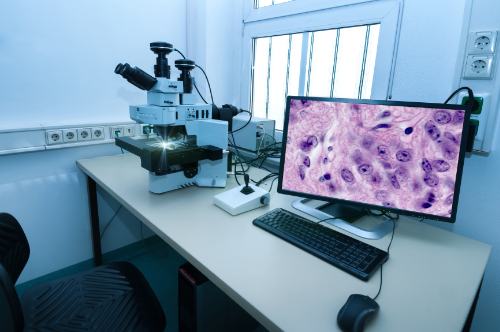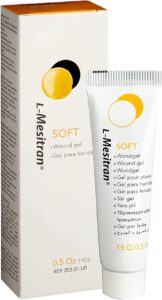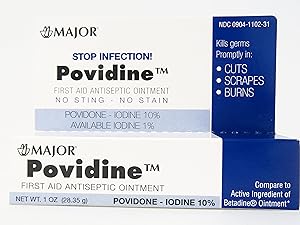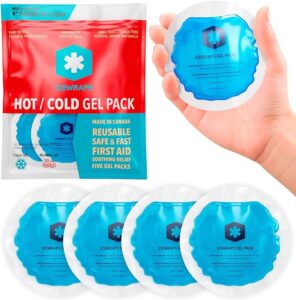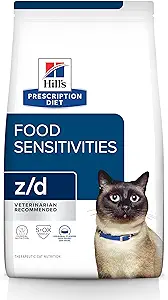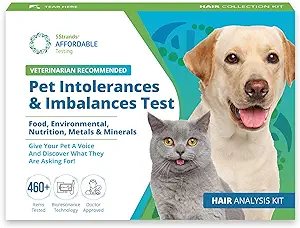What is a mouth sore in a cat?
The fact that your cat has a mouth sore on his lip can have various causes. It is possible that there was a small wound and that it has become infected with a significant mouth sore as a result. There may also be an allergic reaction that causes the skin of the lip to become extremely swollen or even ulcerated. But there may also be an eosinophilic granuloma complex in the lip, for example. Each of these causes is discussed later on in this article.
Symptoms in a cat with a mouth sore
When tissue is inflamed, there is usually a swelling of the tissue. In other words, the lip will be quite swollen if there is a cat with a mouth sore. In addition, the inflammatory reaction can look like a nasty open red and bald spot. We see this especially when there is an eosinophilic granuloma complex, less with “normal” inflammations. Furthermore, a lip can have a purulent discharge if it is inflamed or be extremely smelly. Also, a mouth sore often hurts quite a bit, so they don’t want to eat well because of the pain.
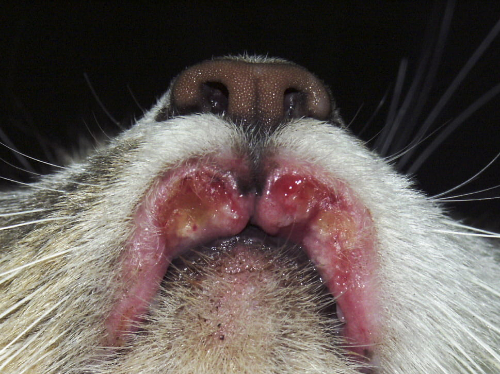
Causes for lip problems in a cat
a wound infection
In most cases, a cat gets mouth sore because a wound on the lip has been penetrated by bacteria. These bacteria will multiply there, resulting in an infection. In a severe case, an abscess can even form in the lip.
You can try to rub this mouth sore with honey ointment 3 times a day. If the wound is a bit more external on the lip, you can also dab the wound with a cotton swab on which you have put some iodine. You can’t do this on the edge or inside of the lip. In both cases, you should treat your cat with a mouth sore 3 times a day for 5-7 days. You should see a clear improvement after a day or two, three. If this is not the case, it is wise to ask your vet for advice. If you see an abscess on your cat’s lip, you should also visit your vet as the honey ointment or iodine cannot penetrate deep enough into the abscess to heal the abcess.
Insect sting
When a cat has been stung by an insect, for example a wasp or a bee, this can cause considerable swelling in the lip. If your cat allows it, you can cool this swelling with a cool pack. But many cats do not accept this. In the case of a cat with a mouth sore due to an insect sting, make sure that the swelling does not spread to the throat and tongue. If this is the case, there is a risk of suffocation. It is therefore wise to go to your vet with an insect sting if you are in doubt. He or she can give your cat an injection that prevents swelling of the tissues. In any case, do not leave your cat with a recent mouth sore on its lip unattended for hours after an insect sting, just to prevent suffocation while you are not around.
Allergic reaction
Actually, we should divide an allergic reaction into two parts. On the one hand, an allergic reaction can develop as a result of an insect sting (see above). The lip will swell enormously as a result of that sting, when an allergic reaction occurs. A cat with a mouth sore as a result of an allergic reaction to an insect sting has an even thicker lip than with a normal insect sting. But it is also possible that he has an allergic reaction to, for example, tree pollen, grass pollen or food. They usually have skin lesions in several places and not just on their lips. But above all, they are very itchy! It is rare that an allergic reaction occurs only on the lip.
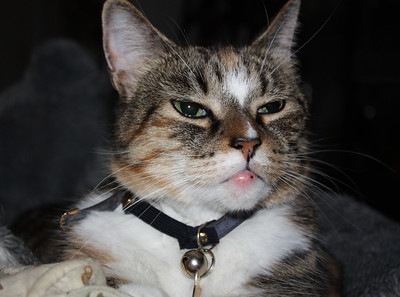
eosinophilic granuloma complex
In the eosinophilic granuloma complex we see a cat with a sore on its mouth. This can be on the lower lip, usually at the level of the incisors. As if a pink, slightly bald ball has grown on his chin (see photo above). But it also occurs regularly on the upper lip and in that case it is usually on the sides of the lips at the level of the canines and molars. On the upper lip, it looks more like a wound or ulceration. These spots do not or hardly heal when we prescribe antibiotics or anti-inflammatories as a veterinarian. In most cases it helps if a cat is given an allergenic diet. Therefore, it is generally thought that this inflammatory response arises as a result of a food allergy.
When you go to your vet, he or she will also tell you that your cat must receive special food to which he cannot react allergically. We prefer to use Hill’s Z/D for this. He must receive this food for at least 8 weeks and he must receive absolutely nothing else besides it. So no sweets or slices of sausage! And no kibble that he takes from the neighbors. You will most likely see no difference during the first 4 weeks, but after 4 weeks the eosinophilic granuloma complex should start to improve. In other words: your cat gets a smaller infection on his lip. It is best if your cat also receives a prednisone treatment from your vet in the meantime so that the inflammatory reaction is suppressed.
Diagnose what is causing the mouth sore in your cat
Did your cat’s mouth sore develop overnight? Then there is a good chance that it is an ordinary infection of a wound or an insect sting. In that case you can treat the wound with honey ointment or iodine as mentioned above. Then the spot should heal in about a week. You do not need to treat insect stings, they will resolve on their own.
Has the mouth sore started slowly and does your cat with a mouth sore seem to get worse every day? Then there is a pretty big chance that it concerns an eosinophilic granuloma complex or another form of an allergy. In either case, it’s a good idea to put him on a food-allergy diet. But it takes a while for it to resolve.
As long as your cat doesn’t have a lot of lip pain, you can wait and see what the food will yield. If it does cause a lot of pain or itching, it is best to ask your vet for advice. He or she can prescribe strong anti-inflammatories and possibly antibiotics to give, while you start the special food in the meantime. It is also possible to test your cat for allergies with the following test kit. You should receive the results within a week. With the results you can search for a food that contains no ingredients that your cat is allergic to. Than the problem should resolve within 4-8 weeks maximum.
If necessary, your vet can also remove a small amount of tissue from your cat’s mouth sore under anesthesia and send it to a lab for testing. They will hopefully come to a definitive diagnosis for your cat with a mouth sore. Then the best treatment can take place. Hopefully your cat will heal pretty soon and no longer have pain from a mouth sore. Good luck!
